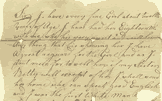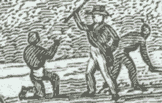|
Two thirds of the slaves brought
to the Americas were brought to produce sugar.
The slave population in the sugar colonies did
not reproduce itself naturally and slave mortality
was especially high so its survival depended on
constant renewal by the African slave trade.
The purchase of a slave was
an investment and they often outnumbered the free
by 20 to 1. Sugar production required intense
labour and slaves were expected to work 18-20
hour days, 7 days a week. They were worked with
the same intensity from the age of 12 and the
burden was only eased for women in the 8th and
9th months of pregnancy.
No leniency was shown toward
the slaves as the plantation owners felt this
could lead to a loss of control. Keeping the slaves
constantly occupied was also seen as a means of
keeping them out of trouble. The beliefs of the
slaves were something the owners had no authority
over and they tried to convert the slaves to Christianity.
There were frequent uprisings which were punished
with great severity and a slave could receive
the death penalty for striking the master or his
family.
Fugitive slaves were a
problem and when caught were given severe punishments.
Slaves who harboured fugitives were flogged and
free blacks faced the possibility of re-enslavement.
Many slaves commited suicide by drowning, suffocation,
hanging or by 'fixed melancholy' where they lost
the will to live, stopped eating and drinking
and died. Slave suicides often made up over 80%
of overall suicides.
Staff in Glasgow City
Archives and Special Collections are actively
seeking records relating to Glasgow’s black history
to add to their collections. Do you know of any
organisations, businesses or individuals who may
have records they would like to deposit? If you
do and would like to discuss the potential deposit,
please contact the Duty
Archivist.
TOP
|
|
Letter from William
Colhoun


List of slaves with ages and
duties


Illustration showing
slaves at work


Description of the nature
of slavery, 1823


|